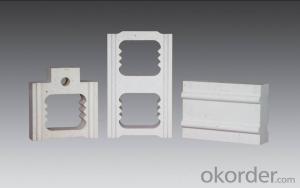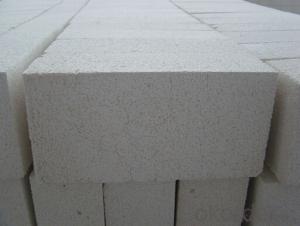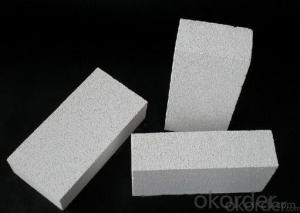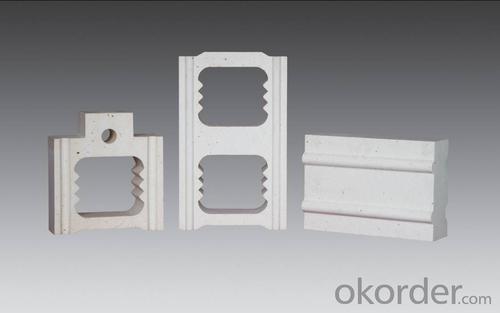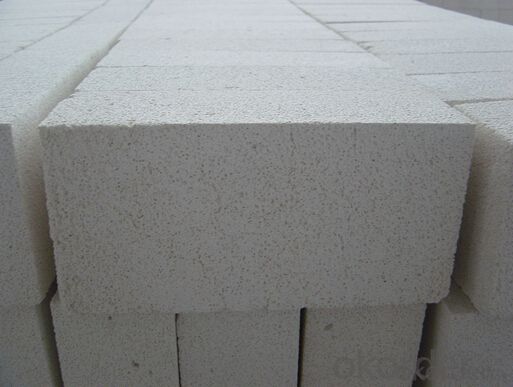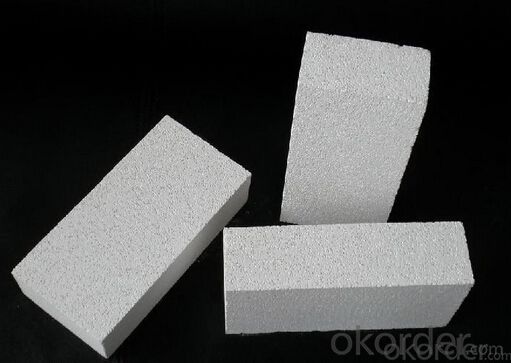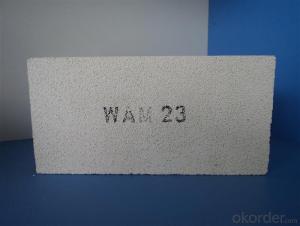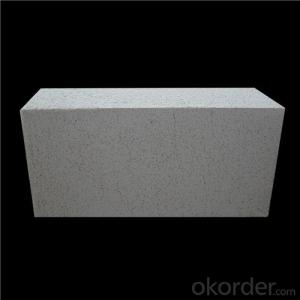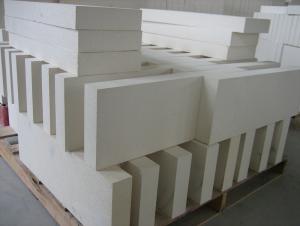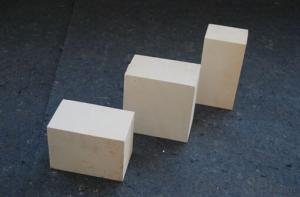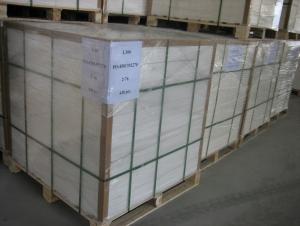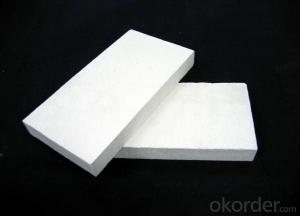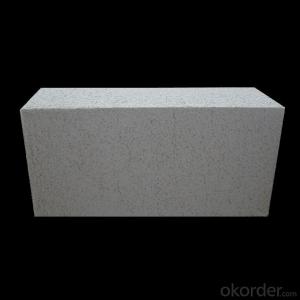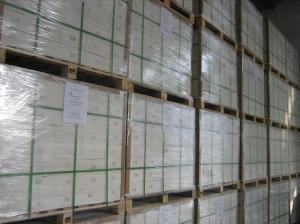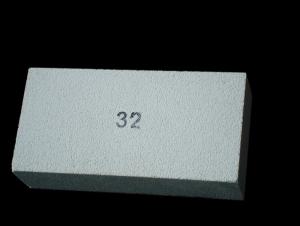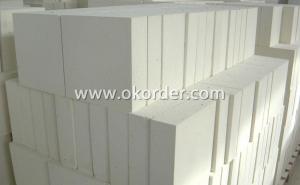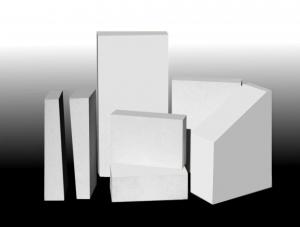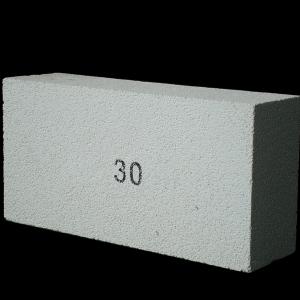Refractory Mullite Insulating Fire Brick JM 32
- Loading Port:
- Shanghai
- Payment Terms:
- TT OR LC
- Min Order Qty:
- 5000 kg
- Supply Capability:
- 100000 kg/month
OKorder Service Pledge
OKorder Financial Service
You Might Also Like
OKORDER Series Insulating Bricks
OKORDER series insulating bricks are a kind of highly efficient, energy saving, low-carbon, environmental protection advanced products which are manufactured according to ASTM standard. OKORDER series products are the best lining and insulation materials in all types of industrial furnaces in the field of Metallurgy, Aluminum, Petrochemical, Ceramics, Power and Glass. They can be applied as heat insulation or no-melt erosion parts of the working layer. The products have been widely used in the following furnaces and achieved satisfactory results.
Application of Insulating Bricks
Metallurgy industry: Blast furnace, Hot blast stove, Reheating furnace, etc.
Petrochemical industry: Ethylene cracking furnace, Hydrogen production furnace, Primary reformer furnace, Reheating furnace, etc.
Ceramics Industry: Roller kiln, Pusher kiln, etc.
Glass industry: Glass furnace regenerator, etc.
Carbon Industry: Carbon roaster, etc.
Aluminum electrolytic industry: aluminum reduction cells,etc.
Other industries: Tunnel kiln, Shuttle kiln, etc.
Advantages of Insulating Bricks
Low Thermal Conductivity: More porosity brings excellent insulation effect, energy saving.
High Crushing Strength: High crushing strength under thermal state, volume stability.
Low Heat Storage: Little thermal storage when absorb more heat, energy saving effect is obvious.
High Purity: Low content of iron, alkaline and metal impurities.
Accurate Dimension: Precise brick size by machining, cutting and grinding special shapes, expediting bricklaying.
Picture of Insulating Bricks
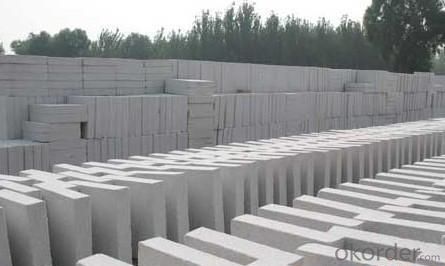
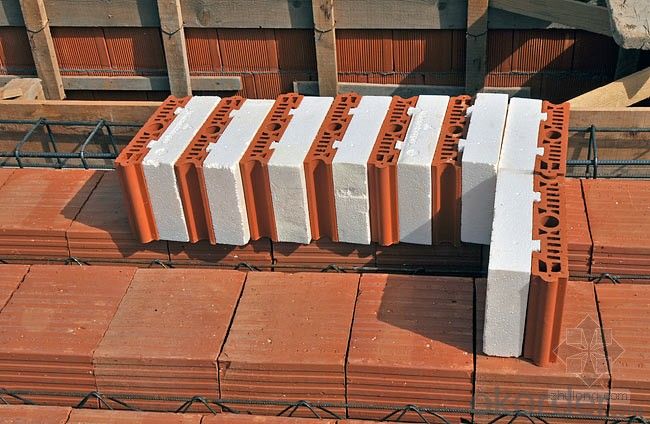
FAQ
1. Which products do you have?
We have all kinds of refractory brick, castable, mortar, cement, ceramic fiber products, etc.
Or you could browse our products to choose what you need.
2. How do you control the products quality?
With strict quality control system throughout the materials selection and production process, our refractory and ceramic fiber products quality is effectively controlled to meet customer requirements.
From the raw materials selecting, our quality control begin. The quality certificates of raw materials are required and each batch will be tested before using. During production, the quality control are conducted by workers and then each piece will be sorted and examined by quality supervise.
3. Can you give me a brief introduction of the application of your products?
We are mainly specializing in the refractory materials in iron and steel, cement, glass, ceramics, petrochemical, electric power Industry, etc.
4. If I need your offer, what information do you need?
In order to choose suitable products, it will be appreciated to provide us the information, such us specification, technical data, order quantity, products application etc.
If any question, please contact us freely.
- Q: Can insulating fire bricks be used in the construction of kilns?
- Insulating fire bricks have the ability to be utilized in the construction of kilns. With a focus on possessing a high insulating value, these bricks can endure high temperatures while minimizing heat loss. This attribute renders them well-suited for the task of kiln construction as they effectively preserve and regulate the desired temperature within the kiln. Furthermore, these bricks are lightweight and easily manageable, adding to their convenience in kiln construction. An additional advantage lies in their resistance to thermal shock, an imperative characteristic for kilns that experience swift temperature fluctuations. In general, insulating fire bricks are a favored option for kiln construction due to their insulating properties, durability, and user-friendliness.
- Q: How do insulating fire bricks prevent heat transfer?
- Insulating fire bricks prevent heat transfer through a combination of their composition and structure. These bricks are made from special refractory materials that have high thermal resistance, such as silica, alumina, or clay. These materials have low thermal conductivity, meaning they do not easily conduct heat. Additionally, insulating fire bricks are often manufactured with small air pockets or cells within their structure. These air pockets act as barriers to heat transfer, as air is a poor conductor of heat. When heat is applied to one side of the brick, the low thermal conductivity of the refractory materials and the presence of air pockets work together to minimize the amount of heat that is conducted through the brick. This effectively prevents heat transfer from one side of the brick to the other, providing insulation and reducing energy loss.
- Q: Are insulating fire bricks suitable for use in glass melting furnaces?
- Yes, insulating fire bricks are suitable for use in glass melting furnaces. Insulating fire bricks have high thermal resistance and low thermal conductivity, making them ideal for retaining heat and preventing heat loss in the furnace. Additionally, their lightweight and porous nature allow for efficient energy utilization and reduced fuel consumption.
- Q: How do insulating fire bricks affect energy efficiency?
- Insulating fire bricks improve energy efficiency by reducing heat transfer through walls and floors. They have low thermal conductivity, which means they can effectively trap and retain heat, minimizing heat loss. This allows for better insulation and helps to maintain a stable and comfortable indoor temperature, reducing the need for excessive heating or cooling. Consequently, insulating fire bricks contribute to lower energy consumption and reduced energy costs.
- Q: Do insulating fire bricks require any special insulation blankets or jackets?
- Insulating fire bricks (IFBs) possess exceptional insulating properties, rendering them generally exempt from the need for specialized insulation blankets or jackets. However, in certain circumstances and environments, supplementary insulation may prove necessary. In cases where IFBs are subjected to high temperatures or extreme thermal conditions, the utilization of insulation blankets or jackets can prove advantageous, augmenting insulation capabilities and safeguarding against damage. These supplementary insulation materials serve to diminish heat loss, heighten energy efficiency, and prolong the lifespan of IFBs. Consequently, although not invariably essential, it is worthwhile contemplating the implementation of insulation blankets or jackets in specific scenarios to optimize the performance of insulating fire bricks.
- Q: Can insulating fire bricks be used in ceramic kilns?
- Yes, insulating fire bricks can be used in ceramic kilns. Insulating fire bricks are designed to have low thermal conductivity, which means they are able to retain heat more effectively. This makes them an ideal choice for lining the walls of a kiln, as they help to conserve and distribute heat more evenly throughout the kiln chamber. Additionally, insulating fire bricks are lightweight and have a high resistance to thermal shock, which makes them durable and able to withstand the high temperatures typically reached in ceramic kilns.
- Q: How do insulating fire bricks help improve the efficiency of combustion processes?
- Insulating fire bricks help improve the efficiency of combustion processes by providing excellent thermal insulation, which minimizes heat loss and enhances heat transfer to the desired areas. This insulation prevents excessive heat from escaping to the surroundings, allowing for higher temperatures within the combustion chamber. As a result, the combustion process becomes more efficient, leading to better fuel combustion, reduced fuel consumption, and increased energy savings.
- Q: How do insulating fire bricks affect the overall indoor air quality of a building?
- Insulating fire bricks have a positive impact on the overall indoor air quality of a building. These bricks are designed to resist high temperatures and prevent heat transfer, which helps in maintaining a comfortable and consistent indoor temperature. By improving thermal insulation, they reduce the need for excessive use of heating and cooling systems, thereby minimizing the release of pollutants and improving energy efficiency. Additionally, insulating fire bricks are non-combustible, meaning they do not emit harmful gases or particulate matter when exposed to heat. This further contributes to a healthier indoor environment by reducing the potential for air pollution and respiratory issues.
- Q: Can insulating fire bricks be used as insulation for pizza ovens?
- Indeed, insulation for pizza ovens can be achieved by utilizing insulating fire bricks. Designed to endure high temperatures and offer remarkable thermal insulation, these bricks possess a low thermal conductivity property, enabling them to efficiently retain heat and inhibit its escape from the oven. Consequently, this aids in upholding a steady and elevated temperature within the pizza oven, facilitating even cooking and achieving crispy crusts. Furthermore, insulating fire bricks are lightweight and simple to install, rendering them a favored option for insulating pizza ovens.
- Q: Do insulating fire bricks have a high resistance to creep?
- Yes, insulating fire bricks generally have a high resistance to creep. The low thermal conductivity and high refractoriness of these bricks allow them to withstand high temperatures without significant deformation or creep.
Send your message to us
Refractory Mullite Insulating Fire Brick JM 32
- Loading Port:
- Shanghai
- Payment Terms:
- TT OR LC
- Min Order Qty:
- 5000 kg
- Supply Capability:
- 100000 kg/month
OKorder Service Pledge
OKorder Financial Service
Similar products
Hot products
Hot Searches
Related keywords
